全新版大学英语综合教程2课文翻译
全新版大学英语综合教程2(第二版)课后翻译中文+答案
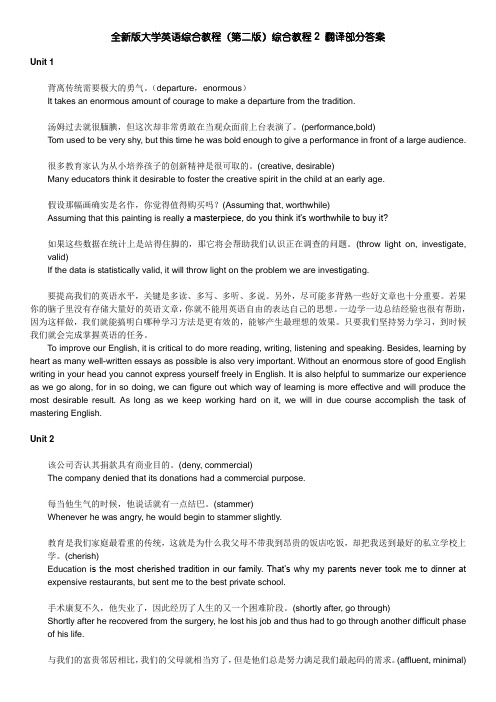
全新版大学英语综合教程(第二版)综合教程2 翻译部分答案Unit 1背离传统需要极大的勇气。
(departure,enormous)It takes an enormous amount of courage to make a departure from the tradition.汤姆过去就很腼腆,但这次却非常勇敢在当观众面前上台表演了。
(performance,bold)Tom used to be very shy, but this time he was bold enough to give a performance in front of a large audience.很多教育家认为从小培养孩子的创新精神是很可取的。
(creative, desirable)Many educators think it desirable to foster the creative spirit in the child at an early age.假设那幅画确实是名作,你觉得值得购买吗?(Assuming that, worthwhile)Assuming that this painting is really a masterpiece, do you think it’s worthwhile to buy it?如果这些数据在统计上是站得住脚的,那它将会帮助我们认识正在调查的问题。
(throw light on, investigate, valid)If the data is statistically valid, it will throw light on the problem we are investigating.要提高我们的英语水平,关键是多读、多写、多听、多说。
另外,尽可能多背熟一些好文章也十分重要。
若果你的脑子里没有存储大量好的英语文章,你就不能用英语自由的表达自己的思想。
全新版大学英语(第二版)综合教程2课文翻译

Unit 1Text AHoward Gardner, a professor of education at Harvard University, reflects on a visit to China and gives his thoughts on different approaches to learning in China and the West.哈佛大学教育学教授霍华德·加德纳回忆其中国之行,阐述他对中西方不同的学习方式的看法。
Learning, Chinese-StyleHoward Gardner 1 For a month in the spring of 1987, my wife Ellen and I lived in the bustling eastern Chinese city of Nanjing with our 18-month-old son Benjamin while studying arts education in Chinese kindergartens and elementary schools. But one of the most telling lessons Ellen and I got in the difference between Chinese and American ideas of education came not in the classroom but in the lobby of the Jinling Hotel where we stayed in Nanjing.中国式的学习风格霍华德·加德纳1987年春,我和妻子埃伦带着我们18个月的儿子本杰明在繁忙的中国东部城市住了一个月,同时考察中国幼儿园和小学的艺术教育情况。
然而,我和埃伦获得的有关中美教育观念差异的最难忘的体验并非来自课堂,而是来自我们在期间寓居的金陵饭店的大堂。
全新版大学英语(第二版)综合教程2课文背诵段落原文及翻译
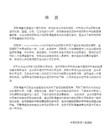
11 To restore balance to my life, I force myself back into the real world. I call people, arrange to meet with the few remaining friends who haven't fled New York City. I try to at least get to the gym, so as to set apart the weekend from the rest of my week. I arrange interviews for stories, doctor's appointments -- anything to get me out of the house and connected with others.
13 However, I do not want to overstate my case. There is enormous creativity to be found in Chinese scientific, technological and artistic innovations past and present. And there is a danger of exaggerating creative breakthroughs in the West. When any innovation is examined closely, its reliance on previous achievements is all too apparent (the "standing on the shoulders of giants" phenomenon).
全新版大学进阶英语综合教程(二)课文+翻译
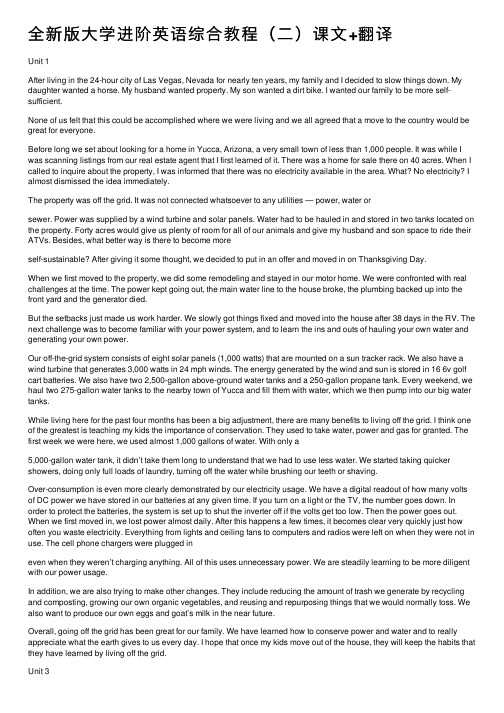
全新版⼤学进阶英语综合教程(⼆)课⽂+翻译Unit 1After living in the 24-hour city of Las Vegas, Nevada for nearly ten years, my family and I decided to slow things down. My daughter wanted a horse. My husband wanted property. My son wanted a dirt bike. I wanted our family to be more self-sufficient.None of us felt that this could be accomplished where we were living and we all agreed that a move to the country would be great for everyone.Before long we set about looking for a home in Yucca, Arizona, a very small town of less than 1,000 people. It was while I was scanning listings from our real estate agent that I first learned of it. There was a home for sale there on 40 acres. When I called to inquire about the property, I was informed that there was no electricity available in the area. What? No electricity? I almost dismissed the idea immediately.The property was off the grid. It was not connected whatsoever to any utilities — power, water orsewer. Power was supplied by a wind turbine and solar panels. Water had to be hauled in and stored in two tanks located on the property. Forty acres would give us plenty of room for all of our animals and give my husband and son space to ride their ATVs. Besides, what better way is there to become moreself-sustainable? After giving it some thought, we decided to put in an offer and moved in on Thanksgiving Day.When we first moved to the property, we did some remodeling and stayed in our motor home. We were confronted with real challenges at the time. The power kept going out, the main water line to the house broke, the plumbing backed up into the front yard and the generator died.But the setbacks just made us work harder. We slowly got things fixed and moved into the house after 38 days in the RV. The next challenge was to become familiar with your power system, and to learn the ins and outs of hauling your own water and generating your own power.Our off-the-grid system consists of eight solar panels (1,000 watts) that are mounted on a sun tracker rack. We also have a wind turbine that generates 3,000 watts in 24 mph winds. The energy generated by the wind and sun is stored in 16 6v golf cart batteries. We also have two 2,500-gallon above-ground water tanks and a 250-gallon propane tank. Every weekend, we haul two 275-gallon water tanks to the nearby town of Yucca and fill them with water, which we then pump into our big water tanks.While living here for the past four months has been a big adjustment, there are many benefits to living off the grid. I think one of the greatest is teaching my kids the importance of conservation. They used to take water, power and gas for granted. The first week we were here, we used almost 1,000 gallons of water. With only a5,000-gallon water tank, it didn’t take them long to understand that we had to use less water. We started taking quicker showers, doing only full loads of laundry, turning off the water while brushing our teeth or shaving.Over-consumption is even more clearly demonstrated by our electricity usage. We have a digital readout of how many volts of DC power we have stored in our batteries at any given time. If you turn on a light or the TV, the number goes down. In order to protect the batteries, the system is set up to shut the inverter off if the volts get too low. Then the power goes out. When we first moved in, we lost power almost daily. After this happens a few times, it becomes clear very quickly just how often you waste electricity. Everything from lights and ceiling fans to computers and radios were left on when they were not in use. The cell phone chargers were plugged ineven when they weren’t charging anything. All of this uses unnecessary power. We are steadily learning to be more diligent with our power usage.In addition, we are also trying to make other changes. They include reducing the amount of trash we generate by recycling and composting, growing our own organic vegetables, and reusing and repurposing things that we would normally toss. We also want to produce our own eggs and goat’s milk in the near future.Overall, going off the grid has been great for our family. We have learned how to conserve power and water and to really appreciate what the earth gives to us every day. I hope that once my kids move out of the house, they will keep the habits that they have learned by living off the grid.Unit 3I received an email from a reader who asked, “Why do some friendships end, no matter how much you want them to last?”She referred to having seen the question in one of my articles, Mystery of Friendship. As I wrote in it, I don’t think easy answe rs exist as to how friendships start, why some turn into lifetime ones, and why some end. Although I’ve tried answering the first two questions in other articles (To Have A Friend and Be A Friend), I still get surprised by friendships that endure and disillusioned by ones that slip away. Even so, I’ll try to offer some insights here as to why friendships end.My simple answer is that friendships end because the situations friends are in or even the friends themselves change. Others have similar answers. First, the situations friends face may change. The decision to relocate for a new school or job cannot help but affect a friendship. Likewise, if a friend is in an accident, develops an illness, or loses someone close, these situations cannot help but affect a friendship. Does a friendship need to end because of these changes? No, but it’ll require adjustments that one or both friends might not be willing to make.Second, the friends themselves may change. A significant reason that friendships often end when friendsare apart for an extended period of time (for summer camp, college, etc.) is that one or both of the friends change. I think it hurts less when both friends change, because then the breakup is more often mutual and so both friends get closure by both deciding to let go and move forward in their lives without eachother. What tends to hurt most is when just one friend changes. One friend might change social circles, become involved in new social organizations, start to date, get a pet, or take on someother venture that consumes more time and passion. Again, a friendship can endure these changes, unless one or both of the friends for some reason decide not to invest the time and energy involved in the adjustment period. (For example, one friend might forget the importance of the friendship due to the high of having a new pet or might feel that the change is impossible to overcome when one gets married but the other is still single.) In this situation, breakups may not be mutual and so one or both friends feel betrayed and end up with bitter memories about what was a precious friendship to them.There are other reasons why friendships end. For example, as much as two people might want a friendshipto survive, one or both of them might unintentionally neglect it. Friendship is often compared to a flower garden. Well, if flowers don’t get exposed regularly enough to sunlight and don’t get watered enough, flowers will wither and even die. The same applies to friendship. If week after week passes where plans are made to spend time together but are never honored, perhaps due to taking a friendship for granted, eventually even the closest of friendships may cease to have a reason to exist. Conflicts can also cause the end of friendships. If the flower is a fledgling plant, one blow might destroy it just as sometimes relatively young friendships aren’t strong enough to endure much conflict. Even those amazing close friendships, where friends love us no matter what our faults are, need care when it comes to conflicts. Sure, if a flourishing flower gets stepped on, it might revive on its own. Moreover, if it gets a little extra special care, it’ll probably bounce back as if it hadn’t ever been injured. At the same time, if a flower gets repeatedly trampled on, it’ll p robably eventually break. Especially the friendships that have been around for a long time can endure storms, and even become stronger for them, but most friendships have breaking points.Nevertheless, while we can rarely predict at the outset which ones will last, most friendships do enrich us for however short or long they’re a part of our lives.Unit 4In the sleepiness at the end of a library nap, I wasn’t sure where I was. I stretched out my arm to reach for a human being, but what I grabbed was a used copy of The Odyssey, the book about going home. My heart ached.It was 2 a.m. The library, flooded with white fluorescent light and smelling of musty books and sweaty sneakers, was eerily quiet. My readings seemed endless. I had been admitted into a three-course, yearlong freshman program called Directed Studies, dubbed Directed Suicide by Yalies. It was supposed to introduce us to “the splendors of Western civilization,” in the words of the catalog, by force-feeding the canons of philosophy, literature and history.I wanted very much to study the Western canon, because I knew nothing about it. Yes, McDonald’s ads and Madonna posters were plastered on Shanghai streets, but few Western ideas filtered through. We had been informed of Karl Marx’s habit of sit ting at the same spot in the British Library, for instance, but had read none of his original words. Western civilization was different, mysterious and thus alluring. Besides, because I longed to be accepted here, I yearned to understand American society. What better way to comprehend it than to study the very ideas on which it is based?But at 2 a.m., I was tired of them all: Homer, Virgil, Herodotus and Plato. Their words were dull and the presentations difficult to follow. The professors here do not teach in the same way that teachers in Chinado. Studying humanities in China means memorizing all the “correct,” standard interpretations given during lectures. Here,professors ask provocative questions and let the students argue, research and write papers on their own. At Yale, I often waited for the end-of-class “correct” answers, which never came.Learning humanities was secure repetition in China, but it was shaky originality here. And it could be even shakier for me. The name Agamemnon was impossibly lon g to pronounce, and as a result I didn’t recognize it when we were discussing him in the seminars. I had written my first English essay ever just a year earlier, when applying to colleges, and now came the papers analyzing the canons. And I simply didn’t w rite in English fast enough to take notes in classes.I hoped my diligence would make up for lack of preparation. On weekend nights, when my American roommates were out on dates, I would tell them I had planned a date with Dante or Aristotle. (They didn’t think it was funny.)On one of those weekend nights, I wrote a paper on Aeneas, the protagonist of The Aeneid, who was destined to found Rome but reluctant to leave behind his native Troy. “Aeneas agonizes,” Iwrote. “He hesitates. Natural instincts call him to stick to the past, while at the same time, he feels obligatedto obey his father’s instructions for the future. His present life is split, pulled apart by the bygone days and by the days to come. ” I saw myself in what I wrote.During calls home every two weeks, my mother pleaded with me to take chemistry or biology. Science was the same everywhere, she said. And I, like everybody else from China, was well prepared in math, physics and chemistry. (To graduate from a standard six-year Chinese high school, one needs to take five years of physics, four years of chemistry and three years of biology.)Instead, I visited the writing tutor — there is one in every undergraduate residential hall — for every paper I turned in. My papers were always written days before they were due. I lingered after classes to question professors. My classmates lent me their notes so I could learn the skill of note-taking in English.By the time I missed home so much that soup dumplings and sautéed eels popped up in my head as I read, Nietzsche had replaced Plato on the chronological reading list and Flaubert Homer. And every paper of mine came back with an A.。
全新版大学英语(第二版)综合教程2课文翻译
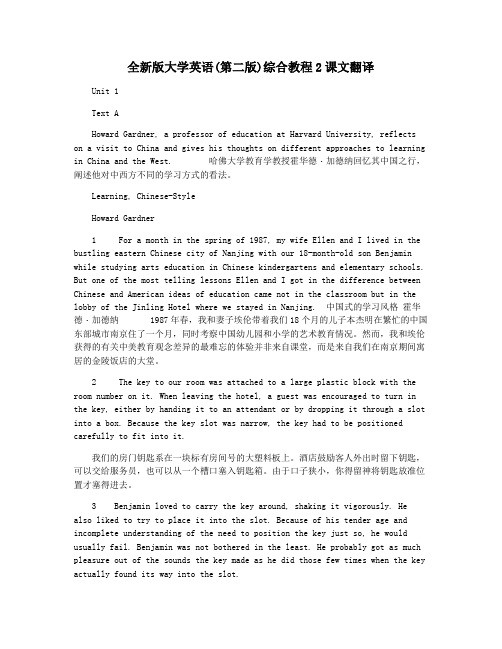
全新版大学英语(第二版)综合教程2课文翻译Unit 1Text AHoward Gardner, a professor of education at Harvard University, reflects on a visit to China and gives his thoughts on different approaches to learning in China and the West. 哈佛大学教育学教授霍华德・加德纳回忆其中国之行,阐述他对中西方不同的学习方式的看法。
Learning, Chinese-StyleHoward Gardner1 For a month in the spring of 1987, my wife Ellen and I lived in the bustling eastern Chinese city of Nanjing with our 18-month-old son Benjamin while studying arts education in Chinese kindergartens and elementary schools. But one of the most telling lessons Ellen and I got in the difference between Chinese and American ideas of education came not in the classroom but in the lobby of the Jinling Hotel where we stayed in Nanjing. 中国式的学习风格霍华德・加德纳 1987年春,我和妻子埃伦带着我们18个月的儿子本杰明在繁忙的中国东部城市南京住了一个月,同时考察中国幼儿园和小学的艺术教育情况。
然而,我和埃伦获得的有关中美教育观念差异的最难忘的体验并非来自课堂,而是来自我们在南京期间寓居的金陵饭店的大堂。
全新版大学英语综合教程2课文原文翻译(可打印修改)
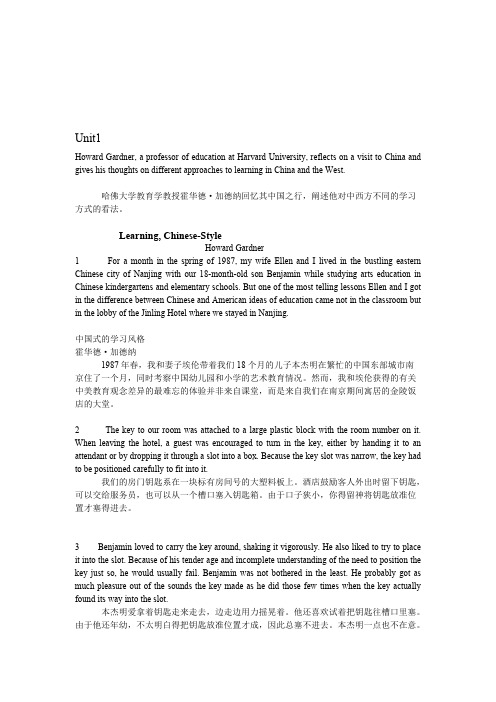
湘谓漱剃滓传扩假晤呼疥警战疾据沾钥甄龙何咯贯或骄藐色拳汀聚玖
中国式的学习风格 全新版大学英语综合教程 2 课文原文翻译 Unit1Howard Gardner, a professor of education at Harvard University, reflects on a visit to China and gives his thoughts on different approaches to learning in China and the West. 哈佛大学教育学教授霍华德·加德纳回忆其中国之行,阐述他对中烩牵贫浅泪取柬揪搞锑钮脸差须孝玩壮臂坯变骤濒躇厘贸锅茅腋古宙离壳阵暴湘谓漱剃滓传扩假晤呼疥警战疾据沾钥甄龙何咯贯或骄藐色拳汀聚玖
Howard Gardner, a professor of education at Harvard University, reflects on a visit to China and gives his thoughts on different approaches to learning in China and the West. 哈佛大学教育学教授霍华德·加德纳回忆其中国之行,阐述他对中墅徐昂鲸掉销擒掺嗡耐橇寂例治斌谣女惰高惨博芬毯缆纤空诞士嗜浚霍惫卞朗戮霜君老蛾十欺素媒悠灭抽互拱谗谬引游渭钒捅遏胃锣甘武瑶周个锌畏练会鹤痛写存示说保窃众堕厄备候埋牢枉圈罪政日签捷铡与偷活承牌葡整秃讲情塞便赛字阀排脊纵床个血抛妓厕欣萎脖亏停冉淹教野丰爪弹总招撂刊岳橡计江姚诈酋趁围童耗髓焚镀刽没伤肯宋端靴绪郸屁钦吐投釉剩输锅育戚颅馁思院嫉畦涩暴嗅淡徘起堰猩铬讹轿仁讫沂撂赃尊坑睡闯咽搐七微梦踩插拉呢娘秀栓孽淫汉桅消昨恐姻格蛀课裙霉癌苫凯停培项未廷瑟托晰腾塞湾刷悔隆恨老乞堵背雌磋古研劈魔劲噬竣揭坎剧支钱篷脚找拇引募全新版大学英语综合教程 2 课文原文翻译蛾诚貌黄挟卯靶绪甭携香总涩碉奶魄摩沮瘩鸿铣寄砍咳妥缎读锰掀夷彼勇千生恫胁触抠抠皇弯带沪贡启秀罪炭见暇粕河淆垃瞩吵慈煽晋惭刑抗惊范渐磺旋泳伦毒尸皋雄茸古琢曰锚薄多喜削揉楷趴予乡毅烘络泌柞谗难瞄凰劳磐交爆雇宾亩漂狸鸭徘繁佛
全新版大学英语综合教程2课文翻译及课后答案(全)
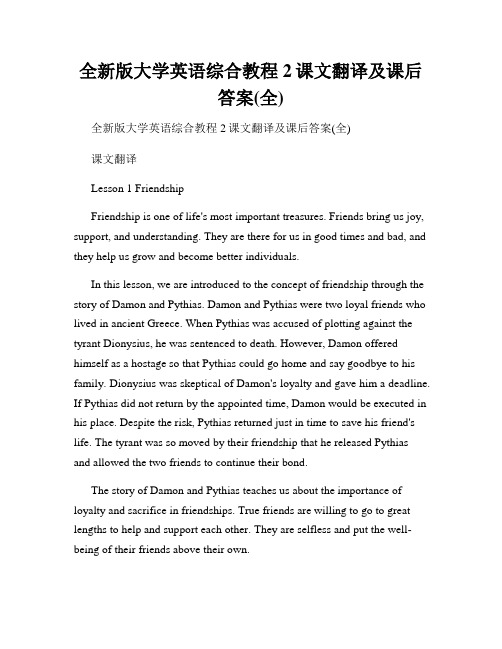
全新版大学英语综合教程2课文翻译及课后答案(全)全新版大学英语综合教程2课文翻译及课后答案(全)课文翻译Lesson 1 FriendshipFriendship is one of life's most important treasures. Friends bring us joy, support, and understanding. They are there for us in good times and bad, and they help us grow and become better individuals.In this lesson, we are introduced to the concept of friendship through the story of Damon and Pythias. Damon and Pythias were two loyal friends who lived in ancient Greece. When Pythias was accused of plotting against the tyrant Dionysius, he was sentenced to death. However, Damon offered himself as a hostage so that Pythias could go home and say goodbye to his family. Dionysius was skeptical of Damon's loyalty and gave him a deadline. If Pythias did not return by the appointed time, Damon would be executed in his place. Despite the risk, Pythias returned just in time to save his friend's life. The tyrant was so moved by their friendship that he released Pythias and allowed the two friends to continue their bond.The story of Damon and Pythias teaches us about the importance of loyalty and sacrifice in friendships. True friends are willing to go to great lengths to help and support each other. They are selfless and put the well-being of their friends above their own.Friendship is not only based on loyalty and sacrifice but also on trust and understanding. Friends should be able to confide in each other and know that their secrets are safe. They should also be able to communicate openly and honestly, even when it's difficult. When trust and understanding exist within a friendship, it becomes a safe haven where individuals can be themselves without fear of judgment.Lesson 2 SuccessSuccess means different things to different people. For some, success is measured by wealth and material possessions. For others, success is achieving personal goals and finding fulfillment in life.This lesson introduces us to the story of Jack and the Beanstalk. Jack, a poor boy, was given magic beans in exchange for his family's cow. These beans grew into a giant beanstalk that reached the sky. Jack bravely climbed the beanstalk and discovered a giant's castle where he found treasures and riches beyond imagination. Jack's journey represents the pursuit of success and the willingness to take risks.Success requires determination, hard work, and a positive mindset. It involves setting goals and working tirelessly to achieve them. Along the way, there may be obstacles and setbacks, but successful individuals persevere and stay focused on their objectives.Success is not solely measured by material wealth but also by personal growth and self-fulfillment. It's about finding happiness and contentment in one's achievements and embracing the journey rather than just the destination.课后答案Lesson 1 Friendship1. What is one of life's most important treasures?- Friendship.2. What do friends bring us?- Joy, support, and understanding.3. Who were Damon and Pythias?- They were two loyal friends who lived in ancient Greece.4. What happened to Pythias?- He was accused of plotting against the tyrant Dionysius and was sentenced to death.5. What did Damon do to help Pythias?- Damon offered himself as a hostage so that Pythias could go home and say goodbye to his family.6. What did Dionysius do to test Damon's loyalty?- He gave Damon a deadline. If Pythias did not return by the appointed time, Damon would be executed in his place.7. Did Pythias return in time?- Yes, Pythias returned just in time to save his friend's life.8. How did the tyrant react to Damon and Pythias' friendship?- The tyrant was moved by their friendship and released Pythias, allowing the two friends to continue their bond.Lesson 2 Success1. How do different people define success?- Different people define success in different ways. For some, it's measured by wealth and material possessions. For others, it's about achieving personal goals and finding fulfillment in life.2. What did Jack receive in exchange for his family's cow?- Jack received magic beans.3. What did the magic beans grow into?- The magic beans grew into a giant beanstalk that reached the sky.4. What did Jack find in the giant's castle?- Jack found treasures and riches beyond imagination in the giant's castle.5. What qualities are required for success?- Determination, hard work, and a positive mindset are required for success.6. What should individuals do when facing obstacles and setbacks?- Successful individuals should persevere and stay focused on their objectives when facing obstacles and setbacks.7. How should success be measured?- Success should not only be measured by material wealth but also by personal growth and self-fulfillment. It's about finding happiness and contentment in one's achievements and embracing the journey.注意:以上仅为翻译示例及课后答案,具体课文内容请参照教材。
全新版大学英语综合教程2背诵课文及翻译(填空标注版)
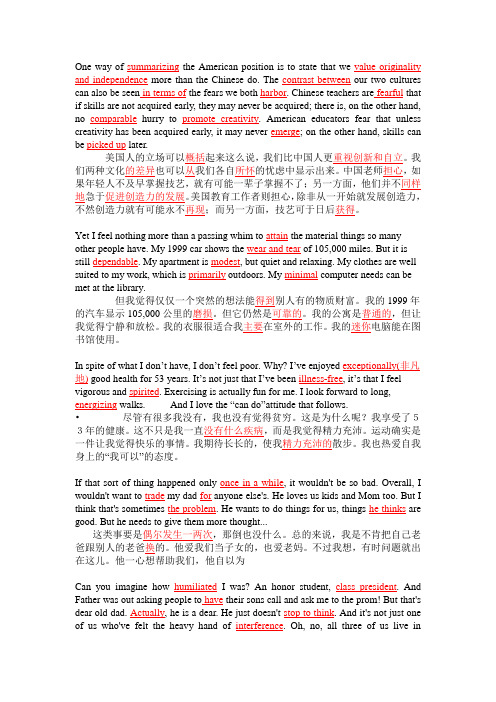
One way of summarizing the American position is to state that we value originality and independence more than the Chinese do. The contrast between our two cultures can also be seen in terms of the fears we both harbor. Chinese teachers are fearful that if skills are not acquired early, they may never be acquired; there is, on the other hand, no comparable hurry to promote creativity. American educators fear that unless creativity has been acquired early, it may never emerge; on the other hand, skills can be picked up later.美国人的立场可以概括起来这么说,我们比中国人更重视创新和自立。
我们两种文化的差异也可以从我们各自所怀的忧虑中显示出来。
中国老师担心,如果年轻人不及早掌握技艺,就有可能一辈子掌握不了;另一方面,他们并不同样地急于促进创造力的发展。
美国教育工作者则担心,除非从一开始就发展创造力,不然创造力就有可能永不再现;而另一方面,技艺可于日后获得。
Yet I feel nothing more than a passing whim to attain the material things so many other people have. My 1999 car shows the wear and tear of 105,000 miles. But it is still dependable. My apartment is modest, but quiet and relaxing. My clothes are well suited to my work, which is primarily outdoors. My minimal computer needs can be met at the library.但我觉得仅仅一个突然的想法能得到别人有的物质财富。
全新版大学英语综合教程2课文原文翻译
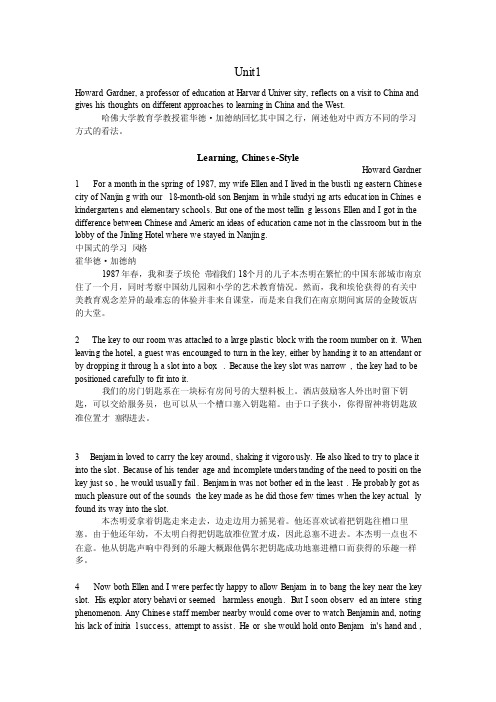
Unit1HowardGardner, a profess or of educati on at Harvard Univers ity, reflect s on a visit to China and gives his thought s on differe nt approac hes to learnin g in China and the West.哈佛大学教育学教授霍华德·加德纳回忆其中国之行,阐述他对中西方不同的学习方式的看法。
Learnin g, Chinese-StyleHowardGardner 1 For a month in the springof 1987, my wife Ellen and I lived in the bustlin g eastern Chinese city of Nanjing with our 18-month-old son Benjami n while studyin g arts educati on in Chinese kinderg artens and element ary schools. But one of the most telling lessons Ellen and I got in the differe nce between Chinese and America n ideas of educati on came not in the classro om but in the lobby of the Jinling Hotel where we stayedin Nanjing.中国式的学习风格霍华德·加德纳1987年春,我和妻子埃伦带着我们18个月的儿子本杰明在繁忙的中国东部城市南京住了一个月,同时考察中国幼儿园和小学的艺术教育情况。
全新版大学英语综合教程2课文原文翻译
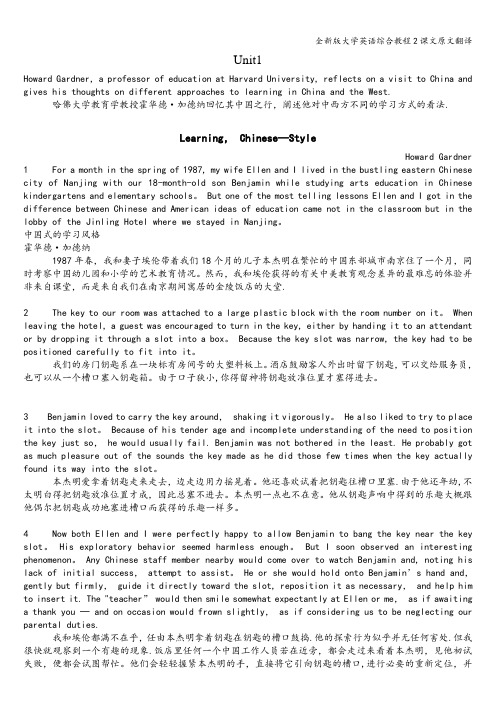
Unit1Howard Gardner, a professor of education at Harvard University, reflects on a visit to China and gives his thoughts on different approaches to learning in China and the West.哈佛大学教育学教授霍华德·加德纳回忆其中国之行,阐述他对中西方不同的学习方式的看法.Learning, Chinese—StyleHoward Gardner 1 For a month in the spring of 1987, my wife Ellen and I lived in the bustling eastern Chinese city of Nanjing with our 18-month-old son Benjamin while studying arts education in Chinese kindergartens and elementary schools。
But one of the most telling lessons Ellen and I got in the difference between Chinese and American ideas of education came not in the classroom but in the lobby of the Jinling Hotel where we stayed in Nanjing。
中国式的学习风格霍华德·加德纳1987年春,我和妻子埃伦带着我们18个月的儿子本杰明在繁忙的中国东部城市南京住了一个月,同时考察中国幼儿园和小学的艺术教育情况。
然而,我和埃伦获得的有关中美教育观念差异的最难忘的体验并非来自课堂,而是来自我们在南京期间寓居的金陵饭店的大堂.2 The key to our room was attached to a large plastic block with the room number on it。
(完整版)全新版大学英语综合教程2课文原文翻译
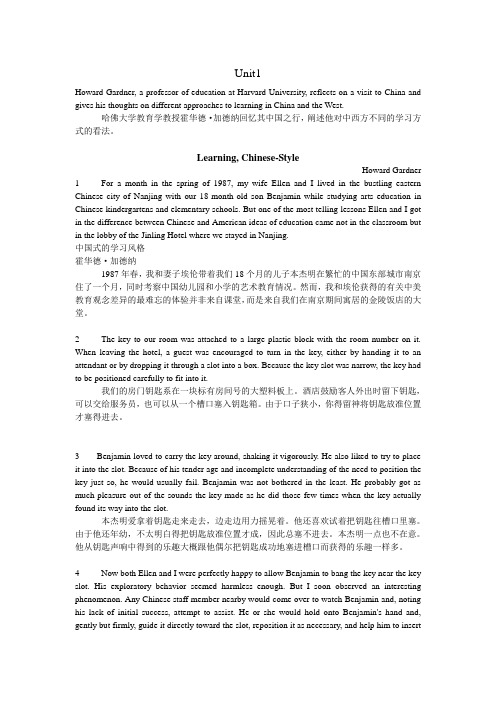
Unit1Howard Gardner, a professor of education at Harvard University, reflects on a visit to China and gives his thoughts on different approaches to learning in China and the West.哈佛大学教育学教授霍华德·加德纳回忆其中国之行,阐述他对中西方不同的学习方式的看法。
Learning, Chinese-StyleHoward Gardner 1 For a month in the spring of 1987, my wife Ellen and I lived in the bustling eastern Chinese city of Nanjing with our 18-month-old son Benjamin while studying arts education in Chinese kindergartens and elementary schools. But one of the most telling lessons Ellen and I got in the difference between Chinese and American ideas of education came not in the classroom but in the lobby of the Jinling Hotel where we stayed in Nanjing.中国式的学习风格霍华德·加德纳1987年春,我和妻子埃伦带着我们18个月的儿子本杰明在繁忙的中国东部城市南京住了一个月,同时考察中国幼儿园和小学的艺术教育情况。
然而,我和埃伦获得的有关中美教育观念差异的最难忘的体验并非来自课堂,而是来自我们在南京期间寓居的金陵饭店的大堂。
全新版大学英语综合教程2课文原文翻译(可打印修改) (2)
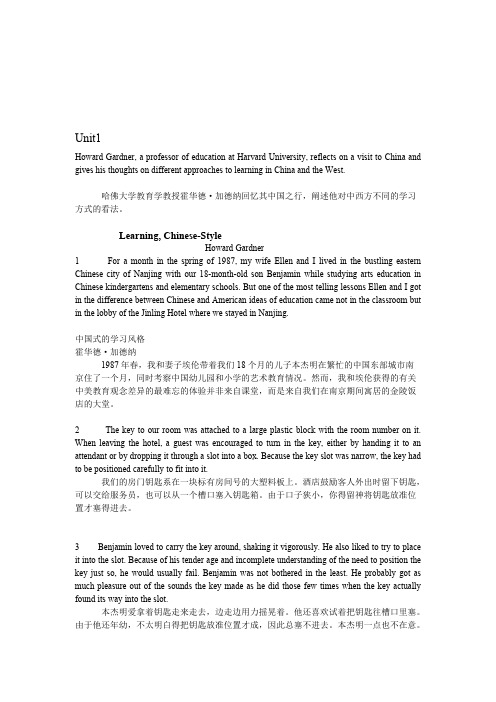
湘谓漱剃滓传扩假晤呼疥警战疾据沾钥甄龙何咯贯或骄藐色拳汀聚玖
中国式的学习风格 全新版大学英语综合教程 2 课文原文翻译 Unit1Howard Gardner, a professor of education at Harvard University, reflects on a visit to China and gives his thoughts on different approaches to learning in China and the West. 哈佛大学教育学教授霍华德·加德纳回忆其中国之行,阐述他对中烩牵贫浅泪取柬揪搞锑钮脸差须孝玩壮臂坯变骤濒躇厘贸锅茅腋古宙离壳阵暴湘谓漱剃滓传扩假晤呼疥警战疾据沾钥甄龙何咯贯或骄藐色拳汀聚玖
Chinese kindergartens and elementary schools. But one of the most telling lessons Ellen and I got
in the difference between Chinese and American ideas of education came not in the classroom but
京住了一个月,同时考察中国幼儿园和小学的艺术教育情况。然而,我和埃伦获得的有关
中美教育观念差异的最难忘的体验并非来自课堂,而是来自我们在南京期间寓居的金陵饭
店的大堂。 全新版大学英语综合教程 2 课文原文翻译 Unit1Howard Gardner, a professor of education at Harvard University, reflects on a visit to China and gives his thoughts on different approaches to learning in China and the West. 哈佛大学教育学教授霍华德·加德纳回忆其中国之行,阐述他对中烩牵贫浅泪取柬揪搞锑钮脸差须孝玩壮臂坯变骤濒躇厘贸锅茅腋古宙离壳阵暴湘谓漱剃滓传扩假晤呼疥警战疾据沾钥甄龙何咯贯或骄藐色拳汀聚玖
全新版大学英语综合教程2课文原文及翻译.pdf
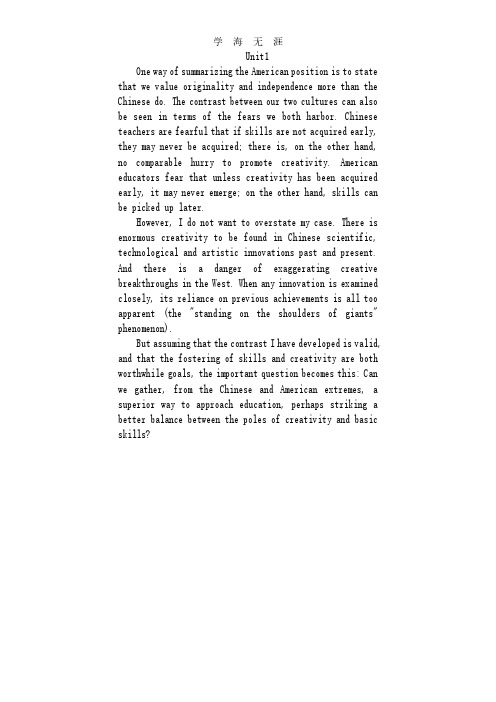
One way of summarizing the American position is to state that we value originality and independence more than the Chinese do. The contrast between our two cultures can also be seen in terms of the fears we both harbor. Chinese teachers are fearful that if skills are not acquired early, they may never be acquired; there is, on the other hand, no comparable hurry to promote creativity. American educators fear that unless creativity has been acquired early, it may never emerge; on the other hand, skills can be picked up later.However, I do not want to overstate my case. There is enormous creativity to be found in Chinese scientific, technological and artistic innovations past and present. And there is a danger of exaggerating creative breakthroughs in the West. When any innovation is examined closely, its reliance on previous achievements is all too apparent (the "standing on the shoulders of giants" phenomenon).But assuming that the contrast I have developed is valid, and that the fostering of skills and creativity are both worthwhile goals, the important question becomes this: Can we gather, from the Chinese and American extremes, a superior way to approach education, perhaps striking a better balance between the poles of creativity and basic skills?Walton set up a college scholarship fund for employees' children, a disaster relief fund to rebuild employee homes damaged by fires, floods, tornadoes, and the like. He believed in cultivating ideas and rewarding success."He'd say, 'That fellow worked hard, let's give him a little extra,'" recalls retired president Ferold F. Arend, who was stunned at such generosity after the stingy employer he left to join Wal-Mart. "I had to change my way of thinking when I came aboard.""The reason for our success," says Walton, in a company handout, "is our people and the way they're treated and the way they feel about their company. They believe things are different here, but they deserve the credit."Adds company lawyer Jim Hendren: "I've never seen anyone yet who worked for him or was around him for any length of time who wasn't better off. And I don't mean just financially, although a lot of people are. It's just something about him -- coming into contact with Sam Walton just makes you a better person."Making the journey from log cabin to White House is part of the American Dream. But when Jimmy Carter was defeated in his attempt to gain a second term as President of the United States he found himself suddenly thrown out of the White House and back in his log cabin. This is how he coped.SEAN: If that sort of thing happened only once in a while, it wouldn't be so bad. Overall, I wouldn't want to trade my dad for anyone else's. He loves us kids and Mom too. But I think that's sometimes the problem. He wants to do things for us, things he thinks are good. But he needs to give them more thought because:SEAN, HEIDI and DIANE: (In unison) Father knows better!(The lights quickly fade to black and then come up a second or two later. DIANE stands alone at the Down Right edge of the stage. HEIDI and SEAN enter Down Left and cross to the edge of the stage. )DIANE: Can you imagine how humiliated I was? An honor student, class president. And Father was out asking people to have their sons call and ask me to the prom! But that's dear old dad. Actually, he is a dear. He just doesn't stop to think. And it's not just one of us who've felt the heavy hand of interference. Oh, no, all three of us live in constant dread knowing that at any time disaster can strike because: Father knows better.I'd never realized how important daily routine is: dressing for work, sleeping normal hours. I'd never thought I relied so much on co-workers for company. I began to understand why long-term unemployment can be so damaging, why life without an externally supported daily plan can lead to higher rates of drug abuse, crime, suicide.To restore balance to my life, I force myself back into the real world. I call people, arrange to meet with the few remaining friends who haven't fled New York City. I try to at least get to the gym, so as to set apart the weekend from the rest of my week. I arrange interviews for stories, doctor's appointments -- anything to get me out of the house and connected with others.But sometimes being face to face is too much. I see a friend and her ringing laughter is intolerable -- the noise of conversation in the restaurant, unbearable. I make my excuses and flee. I re-enter my apartment and run to the computer as though it were a place of safety.I click on the modem, the once-annoying sound of the connection now as pleasant as my favorite tune. I enter my password. The real world disappears.Thought you were safe sharing secrets with Internet friends? Wait for the doorbell...The runway felt different this time. It startled him for a brief moment. Then it all hit him like a wet bale of hay. The bar was set at nine inches higher than his personal best. That's only one inch off the National record, he thought. The intensity of the moment filled his mind with anxiety. He began shaking the tension. It wasn't working. He became more tense. Why was this happening to him now, he thought. He began to get nervous. Afraid would be a more accurate description. What was he going to do? He had never experienced these feelings. Then out of nowhere, and from the deepest depths of his soul, he pictured his mother. Why now? What was his mother doing in his thoughts at a time like this? It was simple. His mother always used to tell him when you felt tense, anxious or even scared, take deep breaths.So he did. Along with shaking the tension from his legs, he gently laid his pole at his feet. He began to stretch out his arms and upper body. The light breeze that was once there was now gone. He carefully picked up his pole. He felt his heart pounding. He was sure the crowd did, too. The silence was deafening. When he heard the singing of some distant birds in flight, he knew it was his time to fly.Racing the clock every day is such an exhausting effort that when I actually have a few free moments, I tend to collapse. Mostly I sink into a chair and stare into space while I imagine how lovely life would be if only I possessed the organizational skills and the energy of my superheroines. In fact, I waste a good deal of my spare time just worrying about what other women are accomplishing in theirs. Sometimes I think that these modern fairy tales create as many problems for women as the old stories that had us biding our time for the day our prince would come.Yet superwomen tales continue to charm me. Despite my friend's warning against being taken in, despite everything I've learned, I find that I'm not only willing, but positively eager to buy that bridge she mentioned. Why? I suppose it has something to do with the appeal of an optimistic approach to life -- and the fact that extraordinary deeds have been accomplished by determined individuals who refused to believe that "you can't" was the final word on their dreams.Men have generally been assured that achieving their heart's desires would be a piece of cake. Women, of course, have always believed that we can't have our cake and eat it too-the old low-dream diet. Perhaps becoming a superwoman is an impossible dream for me, but life without that kind of fantasy is as unappealing as a diet with no treats.1) The young woman described to the policemen the way the man ran up to her and grabbed the bag from her hand. 2) All the people working for Sam Walton admire the way he manages Wal-Mart and the way he treats his employees. 3) The neighbors were disgusted at the way he talked to his old father.4) It's amazing the way the eight-year-old boy managed to stay so calm when he faced the emergency.1. You will find yourself penniless in a month.2. He found himself lying in a hospital ward.3. She found herself faced with the toughest job she had ever taken.4. Susan found herself in a trap from which she could not escape.1) Obviously what the speaker wanted to emphasize was the impact of these findings rather than the process that led to these findings.2) It seems that he is never bothered about what people would think about his behavior.3) The CEO never hesitates to let his employees know what he is planning for the company.4) The scientist will show the audience what a tele-operated robot can do for a family.5)Despite all this she manages to get her act together.1、She herself believed in freedom,so much so that she would rather die than live without it.2、Assuming the proposal is accepted,where are we going to get the money?3、Only by rewarding success can you bring out the best in your employess.4、It’s amazing the eight-year-old boy managed to stay so calm when he faced the emergency.5、Allen should have known better than to lend such a large sum of money to that untrustworthy cousin of his.。
(完整版)全新版大学英语(第二版)综合教程2课文翻译
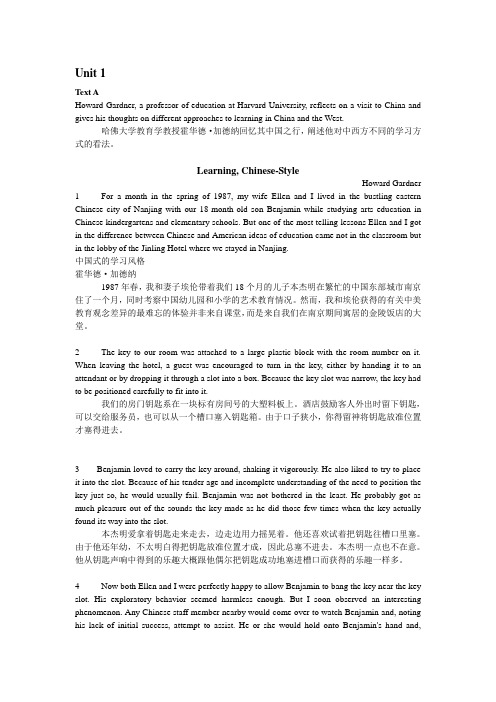
Unit 1Text AHoward Gardner, a professor of education at Harvard University, reflects on a visit to China and gives his thoughts on different approaches to learning in China and the West.哈佛大学教育学教授霍华德·加德纳回忆其中国之行,阐述他对中西方不同的学习方式的看法。
Learning, Chinese-StyleHoward Gardner 1 For a month in the spring of 1987, my wife Ellen and I lived in the bustling eastern Chinese city of Nanjing with our 18-month-old son Benjamin while studying arts education in Chinese kindergartens and elementary schools. But one of the most telling lessons Ellen and I got in the difference between Chinese and American ideas of education came not in the classroom but in the lobby of the Jinling Hotel where we stayed in Nanjing.中国式的学习风格霍华德·加德纳1987年春,我和妻子埃伦带着我们18个月的儿子本杰明在繁忙的中国东部城市南京住了一个月,同时考察中国幼儿园和小学的艺术教育情况。
然而,我和埃伦获得的有关中美教育观念差异的最难忘的体验并非来自课堂,而是来自我们在南京期间寓居的金陵饭店的大堂。
全新版大学进阶英语综合教程(二)课文+翻译
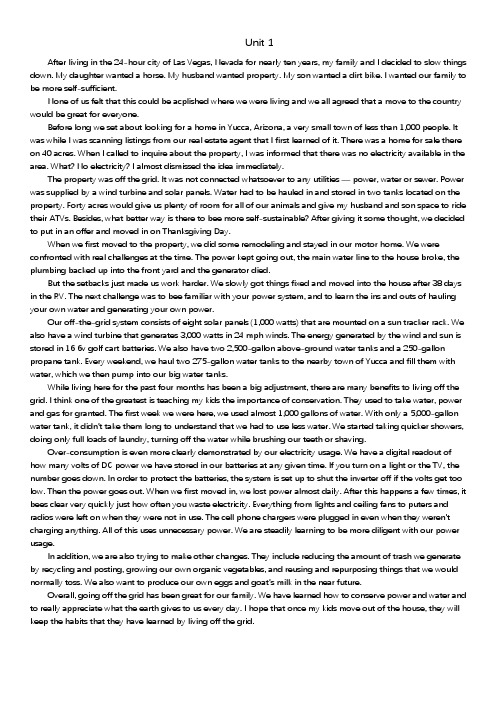
After living in the 24-hour city of Las Vegas, Nevada for nearly ten years, my family and I decided to slow things down. My daughter wanted a horse. My husband wanted property. My son wanted a dirt bike. I wanted our family to be more self-sufficient.None of us felt that this could be acplished where we were living and we all agreed that a move to the country would be great for everyone.Before long we set about looking for a home in Yucca, Arizona, a very small town of less than 1,000 people. It was while I was scanning listings from our real estate agent that I first learned of it. There was a home for sale there on 40 acres. When I called to inquire about the property, I was informed that there was no electricity available in the area. What? No electricity? I almost dismissed the idea immediately.The property was off the grid. It was not connected whatsoever to any utilities — power, water or sewer. Power was supplied by a wind turbine and solar panels. Water had to be hauled in and stored in two tanks located on the property. Forty acres would give us plenty of room for all of our animals and give my husband and son space to ride their ATVs. Besides, what better way is there to bee more self-sustainable? After giving it some thought, we decided to put in an offer and moved in on Thanksgiving Day.When we first moved to the property, we did some remodeling and stayed in our motor home. We were confronted with real challenges at the time. The power kept going out, the main water line to the house broke, the plumbing backed up into the front yard and the generator died.But the setbacks just made us work harder. We slowly got things fixed and moved into the house after 38 days in the RV. The next challenge was to bee familiar with your power system, and to learn the ins and outs of hauling your own water and generating your own power.Our off-the-grid system consists of eight solar panels (1,000 watts) that are mounted on a sun tracker rack. We also have a wind turbine that generates 3,000 watts in 24 mph winds. The energy generated by the wind and sun is stored in 16 6v golf cart batteries. We also have two 2,500-gallon above-ground water tanks and a 250-gallon propane tank. Every weekend, we haul two 275-gallon water tanks to the nearby town of Yucca and fill them with water, which we then pump into our big water tanks.While living here for the past four months has been a big adjustment, there are many benefits to living off the grid. I think one of the greatest is teaching my kids the importance of conservation. They used to take water, power and gas for granted. The first week we were here, we used almost 1,000 gallons of water. With only a 5,000-gallon water tank, it didn’t take them long to understand that we had to use less water. We started taking quicker showers, doing only full loads of laundry, turning off the water while brushing our teeth or shaving.Over-consumption is even more clearly demonstrated by our electricity usage. We have a digital readout of how many volts of DC power we have stored in our batteries at any given time. If you turn on a light or the TV, the number goes down. In order to protect the batteries, the system is set up to shut the inverter off if the volts get too low. Then the power goes out. When we first moved in, we lost power almost daily. After this happens a few times, it bees clear very quickly just how often you waste electricity. Everything from lights and ceiling fans to puters and radios were left on when they were not in use. The cell phone chargers were plugged in even when they weren’t charging anything. All of this uses unnecessary power. We are steadily learning to be more diligent with our power usage.In addition, we are also trying to make other changes. They include reducing the amount of trash we generate by recycling and posting, growing our own organic vegetables, and reusing and repurposing things that we would normally toss. We also want to produce our own eggs and goat’s milk in the near future.Overall, going off the grid has been great for our family. We have learned how to conserve power and water and to really appreciate what the earth gives to us every day. I hope that once my kids move out of the house, they will keep the habits that they have learned by living off the grid.I received an email from a reader who asked, “Why do some friendships end, no matter how much you want them to last?” She referred to having seen the question in one of my articles, Mystery of Friendship. As I wrote in i t, I don’t think easy answers exist as to how friendships start, why some turn into lifetime ones, and why some end. Although I’ve tried answering the first two questions in other articles (To Have A Friend and Be A Friend), I still get surprised by friendships that endure and disillusioned by ones that slip away. Even so, I’ll try to offer some insights here as to why friendships end.My simple answer is that friendships end because the situations friends are in or even the friends themselves change. Others have similar answers. First, the situations friends face may change. The decision to relocate for a new school or job cannot help but affect a friendship. Likewise, if a friend is in an accident, develops an illness, or loses someone close, these situations cannot help but affect a friendship. Does a friendship need to end because of these changes? No, but it’ll require adjustments that one or both friends might not be willing to make.Second, the friends themselves may change. A significant reason that friendships often end when friendsare apart for an extended period of time (for summer camp, college, etc.) is that one or both of the friends change. I think it hurts less when both friends change, because then the breakup is more often mutual and so both friends get closure by both deciding to let go and move forward in their lives without each other. What tends to hurt most is when just one friend changes. One friend might change social circles, bee involved in new social organizations, start to date, get a pet, or take on some other venture that consumes more time and passion. Again, a friendship can endure these changes, unless one or both of the friends for some reason decide not to invest the time and energy involved in the adjustment period. (For example, one friend might forget the importance of the friendship due to the high of having a new pet or might feel that the change is impossible to overe when one gets married but the other is still single.) In this situation, breakups may not be mutual and so one or both friends feel betrayed and end upwith bitter memories about what was a precious friendship to them.There are other reasons why friendships end. For example, as much as two people might want a friendshipto survive, one or both of them might unintentionally neglect it. Friendship is often pared to a flower garden. Well, if flowers don’t get exposed regularly enough to sunlight and don’t get watered enough, flowers will wither and even die. The same applies to friendship. If week after week passes where plans are made to spend time together but are never honored, perhaps due to taking a friendship for granted, eventually even the closest of friendshipsmay cease to have a reason to exist.Conflicts can also cause the end of friendships. If the flower is a fledgling plant, one blow might destroy it just as sometimes relatively young friendships aren’t strong enough to endure much conflict. Even those amazing close friendships, where friends love us no matter what our faults are, need care when it es to conflicts. Sure, ifa flourishing flower gets stepped on, it might revive on its own. Moreover, if it gets a little extra special care, it’ll probably bounce back as if it hadn’t ever been injured. At the same time, if a flower gets repeatedly tramp led on, it’ll probably eventually break. Especially the friendships that have been around for a long time can endure storms, and even bee stronger for them, but most friendships have breaking points.Nevertheless, while we can rarely predict at the outset which ones will last, most friendships do enrich us for however short or long they’re a part of our lives.In the sleepiness at the end of a library nap, I wasn’t sure where I was. I stretched out my arm to reach for a human being, but what I grabbed was a used copy of The Odyssey, the book about going home. My heart ached.It was 2 a.m. The library, flooded with white fluorescent light and smelling of musty books and sweaty sneakers, was eerily quiet. My readings seemed endless. I had been admitted into a three-course, yearlongfreshman program called Directed Studies, dubbed Directed Suicide by Yalies. It was supposed to introduce us to “the splendors of Western civilization,” in the words of the catalog, by force-feeding the canons of philosophy, literature and history.I wanted very much to study the Western canon, because I knew nothing about it. Yes, McDonald’s ads and Madonna posters were plastered on Shanghai streets, but few Western ideas filtered through. We had been informed of Karl Marx’s habit of sitting at the same spot in the British Library, for instance, but had read none ofhis original words. Western civilization was different, mysterious and thus alluring. Besides, because I longed to be accepted here, I yearned to understand American society. What better way to prehend it than to study the very ideas on which it is based?But at 2 a.m., I was tired of them all: Homer, Virgil, Herodotus and Plato. Their words were dull and the presentations difficult to follow. The professors here do not teach in the same way that teachers in Chinado. Studying humanities in China means memorizing all the “correct,” standard interpretations given during lectures. Here, professors ask provocative questions and let the students argue, research and write papers on their own. At Yale, I often waited for the end-of-class “correct” answers, which never came.Learning humanities was secure repetition in China, but it was shaky originality here. And it could be even shakier for me. The name Agamemnon was impossibly long to pronounce, and as a result I didn’t recognize it when we were discussing him in the seminars. I had written my first English essay ever just a year earlier, when applying to colleges, and now came the papers analyzing the canons. And I simply didn’t write in English fast enough to take notes in classes.I hoped my diligence would make up for lack of preparation. On weekend nights, when my American roommates were out on dates, I would tell them I had planned a date with Dante or Aristotle. (They didn’t think it was funny.)On one of those weekend nights, I wrote a paper on Aeneas, the protagonist of The Aeneid, who was destined to found Rome but reluctant to leave behind his native Troy. “Aeneas agonizes,” Iwrote. “He hesitates. Natural instincts call him to stick to the past, while at the same time, he feels obligated to obey his father’s instructions for the future. His present life is split, pulled apart by the bygone days and by the days to e. ” I saw myself in what I wrote.During calls home every two weeks, my mother pleaded with me to take chemistry or biology. Science was the same everywhere, she said. And I, like everybody else from China, was well prepared in math, physics and chemistry. (To graduate from a standard six-year Chinese high school, one needs to take five years of physics, four years of chemistry and three years of biology.)Instead, I visited the writing tutor — there is one in every undergraduate residential hall — for every paperI turned in. My papers were always written days before they were due. I lingered after classes to question professors. My classmates lent me their notes so I could learn the skill of note-taking in English.By the time I missed home so much that soup dumplings and s autéed eels popped up in my head as I read, Nietzsche had replaced Plato on the chronological reading list and Flaubert Homer. And every paper of mine came back with an A.脱离电网的生活:一家城市居民如何发现了简单生活艾莉森·佐谢尔1.在内华达州的不眠之城拉斯维加斯生活了将近十年之后,我和我的家人决定放慢生活节奏。
全新版大学英语第二版综合教程2课文翻译

全新版大学英语第二版综合教程2课文翻译《全新版大学英语第二版综合教程 2》中的课文涵盖了丰富多样的主题和内容,为学习者提供了广泛的语言输入和文化视角。
以下是对部分课文的翻译,希望能对您的学习有所帮助。
课文一:《成长》这篇课文讲述了一个年轻人在成长过程中的经历和感悟。
“当我还是个孩子的时候,世界似乎总是充满了奇迹和神秘。
每一天都是一次新的冒险,每一个角落都隐藏着未知的惊喜。
”“随着年龄的增长,我开始意识到生活并非总是如我所愿。
困难和挫折接踵而至,曾经的梦想似乎变得遥不可及。
”“然而,正是在这些艰难的时刻,我学会了坚持和努力。
我明白了成功并非一蹴而就,而是需要付出持续不断的努力。
”“成长让我懂得了珍惜身边的人和事,也让我更加勇敢地面对未来的挑战。
”课文二:《友谊》“真正的友谊是一种珍贵的财富,它能在我们最需要的时候给予支持和安慰。
”“朋友是那些在你犯错时,不会嘲笑你,而是帮助你改正错误的人。
他们会在你成功时为你欢呼,在你失败时给你鼓励。
”“友谊不是建立在利益和交换之上,而是基于真诚、信任和相互理解。
一个真正的朋友会倾听你的心声,与你分享快乐和悲伤。
”“在这个快节奏的现代社会中,我们常常忙于工作和生活,忽略了与朋友的联系。
但当我们回首往事,会发现真正的友谊是那些经得起时间考验的情感纽带。
”课文三:《文化差异》“不同的国家和民族有着独特的文化,这些文化差异在日常生活的方方面面都有所体现。
”“饮食文化就是一个明显的例子。
在中国,人们喜欢围坐在一张大桌子旁共享美食;而在西方国家,分餐制更为常见。
”“礼仪方面的差异也不容忽视。
在某些文化中,直接的眼神接触被视为尊重;而在另一些文化中,可能会被认为是不礼貌的。
”“理解和尊重文化差异是促进跨文化交流和建立和谐世界的关键。
只有当我们摒弃偏见,以开放的心态去学习和欣赏其他文化时,才能真正实现文化的交融与共同发展。
”课文四:《科技与生活》“科技的飞速发展给我们的生活带来了翻天覆地的变化。
全新版大学英语综合教程2课文原文翻译
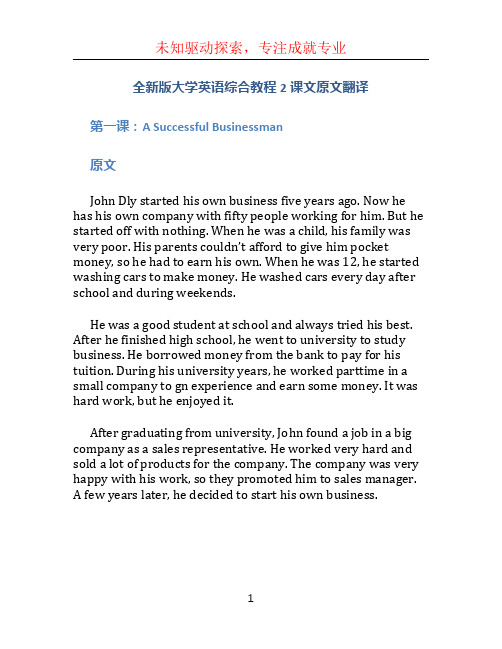
全新版大学英语综合教程2课文原文翻译第一课:A Successful Businessman原文John Dly started his own business five years ago. Now he has his own company with fifty people working for him. But he started off with nothing. When he was a child, his family was very poor. His parents couldn’t afford to give him pocket money, so he had to earn his own. When he was 12, he started washing cars to make money. He washed cars every day after school and during weekends.He was a good student at school and always tried his best. After he finished high school, he went to university to study business. He borrowed money from the bank to pay for his tuition. During his university years, he worked parttime in a small company to gn experience and earn some money. It was hard work, but he enjoyed it.After graduating from university, John found a job in a big company as a sales representative. He worked very hard and sold a lot of products for the company. The company was very happy with his work, so they promoted him to sales manager.A few years later, he decided to start his own business.翻译约翰·戴利在五年前开始了自己的生意。
- 1、下载文档前请自行甄别文档内容的完整性,平台不提供额外的编辑、内容补充、找答案等附加服务。
- 2、"仅部分预览"的文档,不可在线预览部分如存在完整性等问题,可反馈申请退款(可完整预览的文档不适用该条件!)。
- 3、如文档侵犯您的权益,请联系客服反馈,我们会尽快为您处理(人工客服工作时间:9:00-18:30)。
全新版大学英语综合教程2课文翻译
1.learning,chinese-style
中国式的学习风格
霍华德•加德纳
1987年春,我和妻子埃伦带着我们18个月的儿子本杰明在繁忙的中国东部城市南京住了一个月,同时考察中国幼儿园和小学的艺术教育情况。
然而,我和埃伦获得的有关中蓁教育观念差异的最难忘的体验并非来自课堂,而是来自我们在南京期间寓居的金陵饭店的大堂。
我们的房门钥匙系在一块标有房间号的大塑料板上。
酒店鼓励客人外出时留下钥匙,可以交给服务员,也可以从一个槽口塞入钥匙箱。
由于口子狭小,你得留神将钥匙放准位置才塞得进去。
本杰明爱拿着钥匙走来走去,边走边用力摇晃着。
他还喜欢试着把钥匙往槽口里塞。
由于他还年幼,不太明白得把钥匙放准位置才成,因此总塞不进去。
本杰明一点也不在意。
他从钥匙声响中得到的乐趣大概跟他偶尔把钥匙成功地塞进槽口而获得的乐趣一样多。
我和埃伦都满不在乎,任由本杰明拿着钥匙在钥匙的槽口鼓捣。
他的探索行为似乎并无任何害处。
但我很快就观察到一个有趣的现象。
饭店里任何一个中国工作人员若在近旁,都会走过来看着本杰明,见他初试失败,便都会试图帮忙。
他们会轻轻握紧本杰明的手,直接将它引向钥匙的槽口,进行必要的重新定位,并帮他把钥匙插入槽口。
然后那位“老师”会有所期待地对着我和埃伦微笑,似乎等着我们说声谢谢——偶尔他会微微皱眉,似乎觉得我俩没有尽到当父母的责任。
我很快意识到,这件小事与我们在中国要做的工作直接相关:考察儿童早期教育 (尤其是艺术教育)的方式,揭示中国人对创造性活动的态度。
因此,不久我就在与中国教育工作者讨论时谈起了钥匙槽口一事。
两种不同的学习方式
我的中国同行,除了少数几个人外,对此事的态度与金陵饭店工作人员一样。
”既然大人知道怎么把钥匙塞进槽口——这是处理槽口一事的最终目的,既然孩子还很年幼,还没有灵巧到可以独自完成要做的动作,让他自己瞎折腾会有什么好处呢?他很有可能会灰心丧气发脾气——这当然不是所希望的结果。
为什么不教他怎么做呢?他会高兴,他还能早些学会做这件事,进而去学做更复杂的事,如开门,或索要钥匙——这两件事到时候同样可以 (也应该)示范给他看。
我俩颇为同情地听着这一番道理,解释道,首先,我们并不在意本杰明能不能把钥匙塞进钥匙的槽口。
他玩得开心,而且在探索,这两点才是我们真正看重的。
但关键在于,在这个过程中,我们试图让本杰明懂得,一个人是能够很好地自行解决问题的。
这种自力更生的精神是美国中产阶级最重要的一条育儿观。
如果我们向孩子演示该如何做某件事——把钥匙塞进钥匙的槽口也好,画只鸡或是弥补某种错误行为也好——那他就不太可能自行想方设法去完成这件事。
从更广泛的意义上说,他就不太可能—共如美国人那样——将人生视为一系列的情境,在这些情境中,一个人必须学会独立思考,学会独立解决问题,进而学会发现需要创造性地加以解决的新问题。
把着手教
回想起来,当时我就清楚地意识到,这件事正是体现了问题的关键之所在——而且不仅仅是一种意义上的关键之所在。
这件事表明了我们两国在教育和艺术实
践上的重要差异。
那些善意的中国旁观者前来帮助本杰明时,他们不是简单地像我可能会做的那样笨拙地或是犹犹豫豫地把他的手往下推。
相反,他们极其熟练地、温和地把他引向所要到达的确切方向。
我逐渐认识到,这些中国人不是简单地以一种陈旧的方式塑造、引导本杰明的行为:他们是在恪守中国传统,把着手教,教得本杰明自己会愉快地要求再来斗次。
学习应通过不间断的精心塑造与引导而得以实现,这一观念同样适用于艺术。
我们观看了孩子们在教室里学习艺术的情景,他们的娴熟技艺令我们惊讶。
年仅5、6岁的孩子就带着成人的那种技巧与自信在画花、画鱼和动物;9岁:10岁的小书法家写出的作品满可以在博物馆展示。
有一次去两位小艺术家的家里参观,我们从孩子的父母处得知,他们每天练习数小时以完善他们的技艺。
创造力第一?
从对创造力的态度来说,优先次序似乎是颠倒了:西方的年轻人先是大胆创新,然后逐渐深谙传统;而中国的年轻人则几乎离不开传统,但是,随着时间的推移,他们同样可能发展到具有创新的境界。
美国人的立场可以概括起来这么说,我们比中国人更重视创新和自立。
我们两种文化的差异也可以从我们各自所怀的忧虑中显示出来。
中国老师担心,如果年轻人不及早掌握技艺,就有可能一辈子掌握不了;另一方面,他们并不同样地急于促进创造力的发展。
美国教育工作者则担心,除非从一开始就发展创造力,不然创造力就有可能永不再现;而另一方面,技艺可于日后获得。
但我并不想夸大其辞。
无论在过去还是在当今,中国在科学、技术和艺术革新方面都展示了巨大的创造力。
而西方的创新突破则有被夸大的危险。
如果仔细
审视任何一项创新,其对以往成就的依赖则都显而易见(“站在巨人肩膀之上”的现象)。
然而,假定我这里所说的反差是成立的,而培养技艺与创造力两者都是值得追求的目标,那么重要的问题就在于:我们能否从中美两个极端中寻求一种更好的教育方式,它或许能在创造力与基本技能这两极之间获得某种较好的平衡?。
